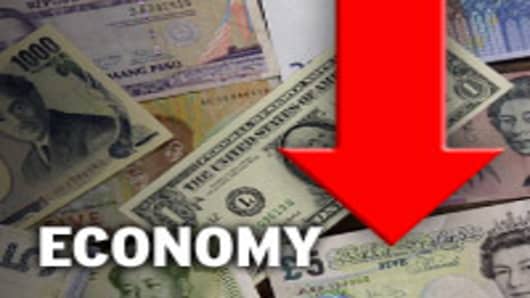The global economy is weak and getting weaker, due in large part to the same policies that helped bring the world back from the brink just a few years ago.
Measures like lowering interest ratesand creating money for central banks to conduct trillions in asset purchases are "now seen as a sign of weakness rather than strength," said Andrew Kenningham, senior global economist at Capital Economics, a London-based forecasting firm.
That view is gaining validity as easing moves last week in Europe and China as well as the recent measure from the Federal Reserve have had little effect in financial markets.
In the meantime, optimism already has turned against a supposed deal to recapitalize European banks, the latest in a long line of plans to staunch the euro zone debt crisisinitially greeted with enthusiasm then quickly discarded as insufficient.
"Hopes that the EU was finally getting to grips with its crisis and that monetary stimulus would boost global demand have faded," Kenningham said in a research note. "With euro break-up risk likely to rise in the second half of the year and monetary policy looking increasingly impotent, things could get much worse before they get better."
Consensus is becoming more widespread that central banks are running out of bullets.
Whereas moves like the Fed's quantitative easingprogram helped restart the illiquid economy during the financial crisis in 2008, few economists think a third version of QE will have much impact. The program involves buying assets like Treasurys and mortgage bonds in an effort to drive down interest rates and spur investment in riskier assets.
But with interest rates near zero and lending improving only incrementally, a QE3, as it is nicknamed in the markets, has few game-changing targets other than another amping up of stock and commodity prices.
"The global economy is in the midst of a synchronized slowdown, as reinforced by the recent spate of weak economic data," said Priya Misra, head of U.S. rates strategy at Bank of America Merrill Lynch. "Unlike 2008, monetary policy easing appears increasingly ineffective while fiscal policy is headed towards contraction in most countries."
Indeed, it appears policy missteps both monetary, such as those from central banks, and fiscal, entailing taxing and spending policies from governments, are likely the greatest obstacles to growth.
"The upshot of less effective monetary easing combined with widespread fiscal tightening is that growth could continue to weaken, both in the US and globally," Misra said. "This will keep policy rates on hold at historically low levels for longer than would otherwise be the case if the monetary policy tools available were more potent."
Those low rates, though, have not translated into economic growth, something that may not happen until normalization takes place. But in a classic Catch-22, interest rate hikes will be hard to justify in the wake of all the slow growth.
The International Monetary Fund recently warned that it will cut its global growth forecast from the present 3.5 percent, and BofA already has lowered its second-quarter tracking to 2.1 percent, the lowest since the world was emerging from the 2009 malaise.
"The most intractable factor is that many borrowers in developed countries are less interest-rate sensitive than in past easing cycles due to the overhang of debt that plagues the US and many other countries," Misra said.
The U.S. fiscal cliffremains the second part of the twin global policy trap, along with the missteps in Europe.
The American dilemma involves a series of tax increases and spending cuts that will take place automatically unless Congress and President Obama reach deficit-reduction goals.
Obama's health-care mandate, recently validated by the Supreme Court as yet another tax for Americans without coverage, adds to the uncertainty in the business climate.
The spillover effects from the issues in Europe and the U.S. are getting worse, helping to slow down Chinese economic growth and softening demand in Japan, which last month saw its biggest decline in manufacturers' tools orders since the Sept. 11 terror attacks on the U.S.
Like its global counterparts, policy moves by the Peoples Bank of China to stem the slowdown are viewed as desperate and ineffective.
"While tame inflation provides greater opportunities for central banks to fight the slowing economy, many investors are coming round to the conclusion that too much of the powder has already been used and is damaging hopes for a rebound," said Andrew Wilkinson, chief economic strategist at Miller Tabak in New York.
So what can governments do?
Some think the best solution is for them to do less, not more. Allowing the cash-rich private sector to sort out its own problems without government's interference likely would be painful but could be the only sustainable path to recovery.
Commenting on Friday's dismal U.S. jobs report, which saw just 80,000 new positions created to wrap up the worst employment quarter in two years, Dennis Gartman, hedge fund manager and author of The Gartman Letter, said governments should "follow a sort of Hippocratic Oath for governance: first do no harm."
"Governments can, at best, try to do little if any harm to the economic environment, and this administration is not only creating harm, it is creating havoc with its health care bill which has jeopardized any hopes for material increases in jobs on the part of private industry until the elections are held and either the current regime is retained or a new regime takes its place," Gartman said "This is the harsh reality of the moment."



